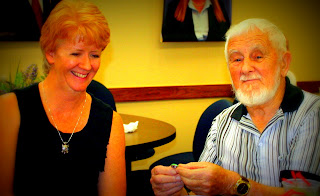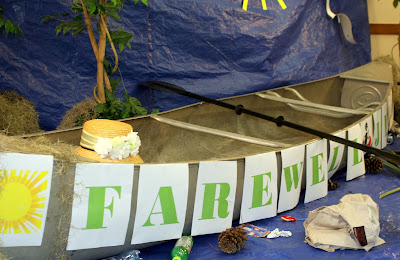Having served the university and its students for 23 years, Jill Lingard has decided to refocus her energies and concentrate on her volunteer work with environmentally-focused, non-profit organizations. Jill began her career here in Admissions in 1989, worked as an academic advisor in the College of Engineering from 1996 to 2001, and spent the last eleven years in the Heavener School of Business as the Associate Director for the Online Business Program. Jill, your friends at UF wish you well in your new endeavors. If you give your new career the same devotion you gave to all of us over the years, you’ll have North Florida’s waterways spic and span in no time! Many thanks to you for being our inspiration and our champion! [Why am I feeling the urge to sing "Happy Trails to You . . ."?]
 |
| Jill and her Dad, Bil Lingard |
You hiked the Appalachian Trail, from Georgia to New
Hampshire. You went skydiving with your
students. And now you’re walking away from a secure job
that you enjoy. What is it in you that
makes you do such crazy things, Jill?
Something in
me is attracted to the potential of experiences in which outcomes are
undefined, but where my actions make a direct impact on those results. I’m comfortable with ambiguity and enjoy not
knowing from day one ‘how it will all work out.’ I also enjoy exploring my physical and mental
limits. To me, nearly all fear is of the
unknown. If I’m willing to stretch
myself and get to know an unfamiliar experience, the fear nearly always
dissolves. By the way, I think this trait is what drew me
to the job I‘ve had for the past decade, so it’s not just about climbing
mountains or jumping out of planes. Launching
an online degree like ours had never been done before, and I was very drawn to all
the possibilities of that process.
 |
| Jill at her going away party with friends from her old stomping grounds in Admissions |
You’ve told us that you’ll be continuing your volunteer work
with Paddle Florida and Current Problems in your new life. Can you tell us more about these
organizations and how you got involved with them? What kind of work have you done with them in
the past and what will your new role be?
When I
returned from my attempted thru-hike of the Appalachian Trail with a fractured
hip, my mobility was severely limited for a few months. But paddling was something I could continue
to enjoy. When I heard about Paddle
Florida’s inaugural week-long trip down the Suwannee River in 2008, I jumped at
the opportunity and have been a fan ever since.
Our paddling experiences brought us into contact with folks doing
cleanups of North Central Florida’s waterways, which is the focus of Current Problems. In 2010, Paddle Florida was granted non-profit status with the mission of supporting
water conservation, wildlife preservation, springs restoration, and waterways
protection through paddling trips staged in each of Florida’s five water
management districts. In addition to the
ongoing cleanup efforts, I will assist both groups with grant writing,
marketing, and PR work.
 |
| Jill, goofing around with longtime co-worker and friend, Joe Rojo |
What are you most looking forward to in your new life?
Refining and
applying my writing skills to causes I believe in and working with an amazingly
talented and dedicated group of citizens who have similar interests in
Florida’s ecosystems.
What will you miss the most about your old life at UF?
Whether they’re
18 or 60, in front of me or online, I will miss being able to impact college
students. What an honor it has been to
be able to influence people as they’re engaged in the process of ‘becoming
themselves.’ I will also miss my
colleagues tremendously. They’ve become
a second family to me and I will make every effort to maintain those
relationships.
The Online Business Program is your baby. You built it from scratch, starting in 2001,
and since that time over 800 students have graduated with their business
degree. What does this mean to you?
Due to
geography, fulltime jobs, or family obligations, the vast majority of those 800
graduates are students who lacked access to a UF degree before our online
program launched in 2002. It has been deeply
rewarding to open up educational access to these students. I get to see the meaning this has written all
over the faces of their family members at commencement.
What piece of advice would you give to student affairs
professionals who are responsible for creating and managing programs?
Study the
market to assess potential demand for the proposed program. Surround yourself with an excellent team of
individuals who have complementary skills sets.
Build good relationships with all the external offices and institutions you’ll
need to depend on to make this thing work.
Ensure students, not tuition dollars, remain the focus of
why you come to work each day. (Take
care of students, and finances will fall into place.) Cultivate a sense of humor.
 |
| Jill, with the Online Business Program Staff |
In the two plus decades you’ve spent at UF, you’ve focused
much of your work on building relationships with community/state college
students and advisors. Why were you
drawn to this group? Where do you see
university-community/state college relations going in the future?
Florida’s
community college system launched my own education and subsequent student
services career. I had a really
wonderful experience at IRCC in the mid-80’s.
Having flourished in that environment, I was thrilled to work with a
program in which our success depends in large part on the ability to cultivate
relationships with community/state college students, advisors, faculty, and
administrators. It felt like ‘coming
home’ to me.
I believe
community and state colleges will continue to play a crucial role in higher education
because of their open access and affordability.
They’ve also been quick to meet the current demands for flexibility by
developing online and hybrid courses and programs. I question the viability of some of their
recently developed Bachelor’s degree options, especially when they duplicate
available options through Florida’s state universities. But their role in providing lower division
and technical education remains unquestionably important.
 |
| From L to R: John Laibson, the new Director of the Online Business Program, Jill, and Dr. Albert Matheny |
What do you foresee for the Online Business Program,
distance learning, and higher education, in general?
Tremendous
growth and increasing quality as more excellent institutions get into the game
and interactive technology improves. In
another decade, I don’t think ‘going to college’ will look anything like what
it did as recently as a decade ago. We
can all sit around and complain about that OR get busy shaping what the higher
education experience will be. It’s been
great fun to be part of a team which has taken the latter approach.
Your love of the written word led you to a position on the
Common Reading Program Book Selection Committee. Out of the zillion or so books you've read for
them, which one was your favorite? Of
the books you’ve read for your own pleasure, which one is your favorite?
I think my
favorite ‘chosen’ CRP book was last year’s Outcasts
United. I’m not a team sports
enthusiast, nor do I have a clue about soccer.
So my enjoyment of this book is a measure of Warren St. John’s ability
to tell a much richer story. For every
year’s chosen book, the committee reads dozens more behind the scenes. One of my favorites this past year for sheer
hilarity was Mary Roach’s Packing for
Mars. Roach does a superb job in all
her books of reaching non-science-types like me with her layman’s take on
science topics. Packing for Mars looks behind the curtain of what it’s really like
to train for and live in space. I enjoyed
it so much, it led me to read the memoir of shuttle astronaut Mike Mullane
(equally comical and engaging)—not a typical selection for this former English
major! Outside of CRP circles, my
favorite author is Charles Frazier. I
loved every word of Cold Mountain and
Thirteen Moons. I had the opportunity to meet Mr. Frazier at
a book signing once and my knees nearly buckled from star-struck awe.
 |
| Jill and one of her favorite professors, Dr. Rich Lutz, and friend Julia Smith |
Who is the person who has influenced you the most in your
time here at UF?
I would have
to say Brian Ray, for bringing me into a team of such innovative and dedicated
individuals, giving me the opportunity to help build something very meaningful
from scratch, and doing whatever was necessary to support that process along
the way.
What’s the biggest life lesson you’ve learned here at UF?
Focus on
what’s working and do more of that.
Don’t dwell on the negative. Fix
it and move on.
What do you view as your greatest accomplishment?
I have
stared at this question with a blank mind for several minutes now. I guess I don’t think in terms of one
greatest accomplishment or accolade.
Every student I’ve impacted who has walked across the commencement stage
is a greatest accomplishment. I’m not
sure who said "You make a living by what you get; you make a
life by what you give," but that sums it up nicely for me.
And finally, “If heaven exists,
what would you like to hear God say when you arrive at the pearly gates?”
“Finally—you’re here! Bill Maher
saved you a seat!”








